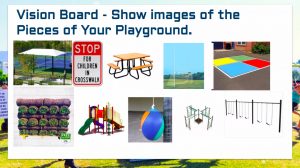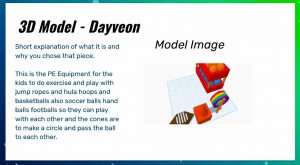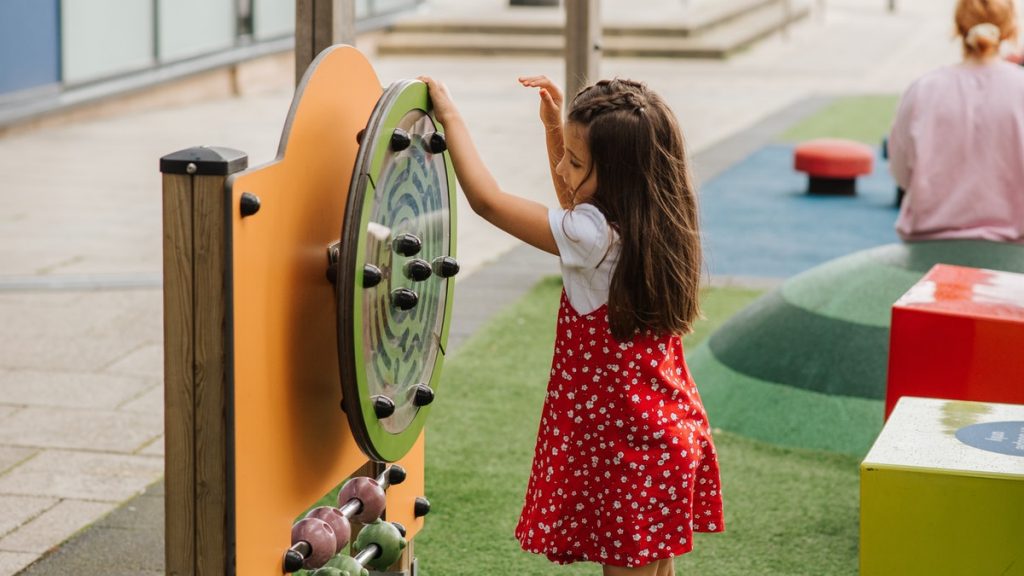By Michael Niehoff
Education Content Coordinator, iLEAD Schools
In project-based learning, learners identify a real-world challenge and work to offer solutions. Sometimes there is no better real-world learning opportunity than the one in our own backyard. That’s what the 7th graders at iLEAD Lancaster discovered while taking on the Playground Project.
The Driving Question
Facilitators Rasheda Young, Briana Wright and Samuel Frank presented the learners with this driving question: “How can I build a fun and functional playground that meets the needs of all learners?” They challenged the learners to not only create their own ideal playground but to design sections to meet the needs of varying grade levels and groups of learners.
“In this project, I wanted to focus on the concept of inclusion,” Young said. “It was important for learners to design with others in mind.”
Through discussions, research and surveys, Young said learners began to realize and coalesce around common challenges on the existing playground.
“My 7th graders developed a common understanding that many learners, of all grade levels, saw the playground as a place where conflicts could develop,” Young said. “They began to ask themselves how they could design a playground where all grades and ages could feel welcome and have fun.”
Research, Planning
After researching playground equipment with inclusive features, as well as collaborating on survey data from their peers, learners began to develop their initial ideas and designs, according to Young.
Research included reading an article from The 74 about how a group of Georgia elementary schoolers designed a playground of their dreams and then ultimately watched it get built.
Along with researching, iLEAD Lancaster learners used math skills to work on budgets and calculate taxes, STEM skills to design blueprints and 3D models in Tinkercad, and English language arts skills to work on their persuasive papers and formal pitch presentations.
“We asked iLEAD Lancaster Director Nykole Kent if we could not only pitch our ideas but even have them be considered for possible implementation,” Young said. Kent agreed to hear the presentations and work to implement the best ideas with the learners’ help.
The Learners’ Ideas

- One group chose UV light for water fountains to address cleanliness and COVID-19 concerns.
- Another group focused on 1st and 2nd grade and benches that could remain cool even during hot weather.
- Another group focused on accessibility by providing wheelchair ramps, as well as new benches and seating for learners who preferred quiet activities.
The learners had to design through the use of vision boards, blueprint designs and 3D modeling. See the sample vision boards here, sample 3D models here and a sample blueprint here.
Presenting to the Panel

- What is the total cost of your playground (including tax)?
- How does your playground support the needs of iLEAD Lancaster learners?
- What inclusive aspects did you add to your playground?
- Why do you think your playground meets the needs of your target group?
- What problems did you encounter while working on your playground?
- What problems did you see with your current playground?
- How will your playground benefit future learners at iLEAD Lancaster?
Impressions
The panel members were thoroughly impressed. Wassner said she was inspired by the quality of work and how the learners engaged their own collective voice.
“Many different aspects were included in the project: math, design, technology, creativity, writing and presentation skills,” Wassner said. “The problem was real, and their solutions were powerful.”
Fredette added that it was exciting for her to see the learners use their own experiences to come up with truly innovative and creative solutions for all learners. “There was such clear evidence that these learners had considered so many aspects of personal inclinations and different kinds of play,” Fredette said. “They moved through the presentations using evidence, data, research and personal stories to impact the panel.”
Nastovska said, “Ms. Young found a way to not only engage middle school learners but spark their interests and ignite their passions.”
Here you can see a copy of the rubric the panel used to provide feedback and critique to the learners.
Moving Forward
iLEAD Lancaster’s 7th graders are determined to implement many of their best ideas to their playground. Currently, Young and her learners are investigating the best approach to obtaining grant funding for this project.
Young is excited about the learning process and long-term development of her learners. “My learners are noticing more and more that our world is often unjust and that people are often treated very unfairly,” she said. “This heightened awareness of social justice, activism and voice are contributing to their realization that they play a big part in making the world better.”

